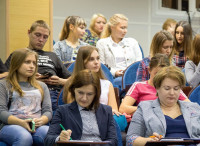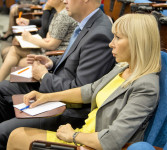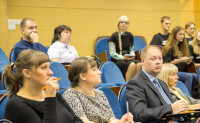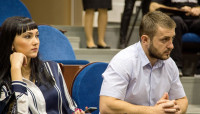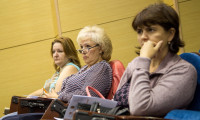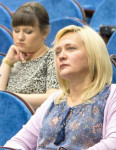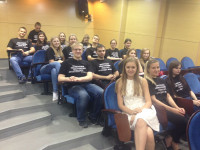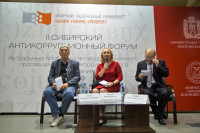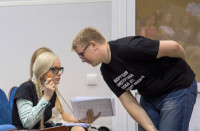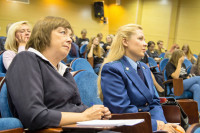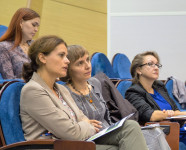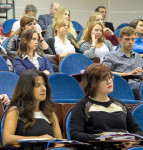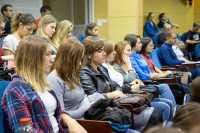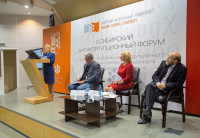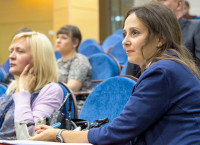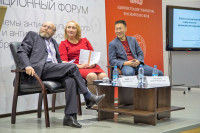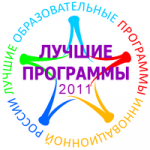Second Siberian Anti-Corruption Forum -- "Current problems of anti-corruption awareness and anti-corruption education”
- Details
-
Last Updated on Saturday, 01 October 2016 06:36
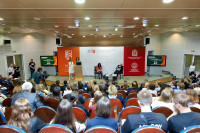 On September 15 to 16, 2016, the Siberian Federal University hosted the Second Siberian Anti-Corruption Forum.
On September 15 to 16, 2016, the Siberian Federal University hosted the Second Siberian Anti-Corruption Forum.
The forum was organized by the Law School of the Siberian Federal University’s Centre for Anti-Corruption and Legal Expertise, the Office of the Governor of the Krasnoyarsk region, the Ministry of Education of the Krasnoyarsk Region, as well as the Civic Assembly of the Krasnoyarsk Region. Anti-Corruption student club of the Siberian Federal University took a direct involvement in the organization of the forum.
Anti-corruption enlightenment and anti-corruption education are two of the key ways of corruption prevention and are considerably complex to implement and administer. In this regard, the education of the public and state officials in activities of anti-corruption measures requires special attention from the state and society generally. This is why the current challenges of educating and making the public and others aware of the importance and scope of the topic of anti-corruption were selected as theme of the Anti-Corruption Forum.
For photographs please visit russian version of this news.
September 15, 2016
By 10:00 o'clock on the morning of September 15, on the campus of the Siberian Federal University, more than 180 representatives of state and local government, law enforcement, educational and social organizations, students and other active members of civil society gathered as participants at the Forum.
The Forum was opened with formal introductory and welcoming remarks by the following presenters:
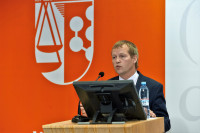 Igor Zhukov – acting as a Chief of Office Management of the Governor of the Krasnoyarsk Region on Safety, Prevention of Corruption and Other Abuses. Igor Zhukov – acting as a Chief of Office Management of the Governor of the Krasnoyarsk Region on Safety, Prevention of Corruption and Other Abuses. |
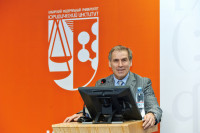 Sergey Mutovin - Vice President for Social Affairs, "Siberian Federal University", Doctor of Economics, Professor. Sergey Mutovin - Vice President for Social Affairs, "Siberian Federal University", Doctor of Economics, Professor. |
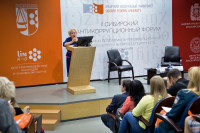 Irina Szyszko - Director of the "Siberian Federal University" Law School, Doctor of Law, Professor. Irina Szyszko - Director of the "Siberian Federal University" Law School, Doctor of Law, Professor. |
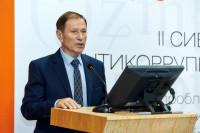 Vladimir Surotkin - Member of the Board of the Civil Assembly of the Krasnoyarsk Region, the Chairman of the Krasnoyarsk Regional Fund for the Support of Patriotic Education Power. Vladimir Surotkin - Member of the Board of the Civil Assembly of the Krasnoyarsk Region, the Chairman of the Krasnoyarsk Regional Fund for the Support of Patriotic Education Power. |
The first day of the forum was dedicated to discussion of general issues of anti-corruption education and anti-corruption awareness. Participants were encouraged to visit the plenary session, a forum for discussion and the presentation of anti-corruption educational methodical information for use within the education system in the Krasnoyarsk Region. These presentations were delivered by recognized experts.
 A guest from France, Ms. Muriel Poisson, the head of research and development department of the International Institute for Educational Planning, UNESСO, and head of the UNESCO "Ethics and Corruption in Education" research project, presented her experiences of anti-corruption education in foreign countries. In her report, Ms. Poisson spoke about the institutional efforts to engage in anti-corruption ethical training within these countries, about the content of anti-corruption education programs and some of the challenges of their implementation. Specific examples of anti-corruption education programs implemented by various organizations were also contained within her report.
A guest from France, Ms. Muriel Poisson, the head of research and development department of the International Institute for Educational Planning, UNESСO, and head of the UNESCO "Ethics and Corruption in Education" research project, presented her experiences of anti-corruption education in foreign countries. In her report, Ms. Poisson spoke about the institutional efforts to engage in anti-corruption ethical training within these countries, about the content of anti-corruption education programs and some of the challenges of their implementation. Specific examples of anti-corruption education programs implemented by various organizations were also contained within her report.
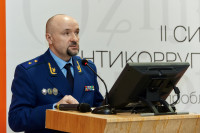 Mr. Mikhail Savchin, prosecutor of the Krasnoyarsk Region, addressed forum participants about the role of prosecutors in the implementation of anti-corruption awareness and education. In his remarks, Mr. Savchin spoke about how the most effective form of legal enlightenment arises from the use of seminars, consultations and "round tables". Prosecutors have taken part in some 255 educational activity events organized both on the prosecutor’s own initiative or on the initiative of public authorities and local self-government between 2015 and 2016. Prosecutors’ bring attention to anti-corruption education within the educational institutions in the region. In addition, prosecutors widely use media recourses to ensure the principle of open and transparent activity. Prosecutors have prepared and issued approximately 2,000 publications about their activity in the field of combating corruption over the past two years, many of which have been posted on the official website of the regional prosecutor's office. Finally, in his concluding remarks, the prosecutor of the region stressed that the success of anti-corruption activities depends primarily on the level of prevailing legal culture and attitudes of the citizenry.
Mr. Mikhail Savchin, prosecutor of the Krasnoyarsk Region, addressed forum participants about the role of prosecutors in the implementation of anti-corruption awareness and education. In his remarks, Mr. Savchin spoke about how the most effective form of legal enlightenment arises from the use of seminars, consultations and "round tables". Prosecutors have taken part in some 255 educational activity events organized both on the prosecutor’s own initiative or on the initiative of public authorities and local self-government between 2015 and 2016. Prosecutors’ bring attention to anti-corruption education within the educational institutions in the region. In addition, prosecutors widely use media recourses to ensure the principle of open and transparent activity. Prosecutors have prepared and issued approximately 2,000 publications about their activity in the field of combating corruption over the past two years, many of which have been posted on the official website of the regional prosecutor's office. Finally, in his concluding remarks, the prosecutor of the region stressed that the success of anti-corruption activities depends primarily on the level of prevailing legal culture and attitudes of the citizenry.
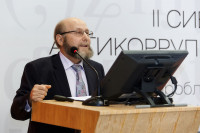 In his address to the forum, Professor Dr. Nikolai Shchedrin, Head of the Department of Criminology and Delictology of Law School of the Siberian Federal University, paid particular attention to the problems of anti-corruption education in the Russian Federation. It was noted by Professor Shchedrin that the key issues include: first, a conscious assumption of corruption by citizens due to the fact that, in the view of most members of society, corrupt activity consists of, at a basic level, giving and receiving bribes, when in truth, corruption includes a large number of other unethical and illegal practices as well as those that remain outside the scope of legal regulation; and second, an understanding of corruption as an enemy from the external influences and “bad actors”, when in truth this phenomenon stems mainly from individuals themselves. As Dr. Shchedrin state: "We are possessed by corruption, which is why we have the task of undertaking anti-corruption enlightenment and education – so that we may awaken the conscience of every member of society.”
In his address to the forum, Professor Dr. Nikolai Shchedrin, Head of the Department of Criminology and Delictology of Law School of the Siberian Federal University, paid particular attention to the problems of anti-corruption education in the Russian Federation. It was noted by Professor Shchedrin that the key issues include: first, a conscious assumption of corruption by citizens due to the fact that, in the view of most members of society, corrupt activity consists of, at a basic level, giving and receiving bribes, when in truth, corruption includes a large number of other unethical and illegal practices as well as those that remain outside the scope of legal regulation; and second, an understanding of corruption as an enemy from the external influences and “bad actors”, when in truth this phenomenon stems mainly from individuals themselves. As Dr. Shchedrin state: "We are possessed by corruption, which is why we have the task of undertaking anti-corruption enlightenment and education – so that we may awaken the conscience of every member of society.”
 Colonel Alexander Rasstrygin, First Deputy Head of the Main Investigation Department of the Investigative Committee of the Russian Federation for the Krasnoyarsk Region, Colonel of Justice, made a report on the role of the investigating authorities in the assistance of the formation of anti-corruption values in the conscience of the general public. Colonel Rasstrygin noted that the issue of combating corruption holds a high priority within the work tasks of the Investigative Committee of the Russian Federation. He also remarked that the most easily detectable evidence of bribery is found within the education and health industries. Fifty-three such crimes were investigated this year alone. Often, persons receiving or transmitting bribes do not realize that no matter how insignificant it may be, bribery is a criminal offense.
Colonel Alexander Rasstrygin, First Deputy Head of the Main Investigation Department of the Investigative Committee of the Russian Federation for the Krasnoyarsk Region, Colonel of Justice, made a report on the role of the investigating authorities in the assistance of the formation of anti-corruption values in the conscience of the general public. Colonel Rasstrygin noted that the issue of combating corruption holds a high priority within the work tasks of the Investigative Committee of the Russian Federation. He also remarked that the most easily detectable evidence of bribery is found within the education and health industries. Fifty-three such crimes were investigated this year alone. Often, persons receiving or transmitting bribes do not realize that no matter how insignificant it may be, bribery is a criminal offense.
This activity may be described as domestic corruption. The importance of the countering of corruption should not be underestimated in the mistaken belief that, because of the pettiness of these crimes, they bring no harm. Domestic corruption is a comprehensive, highly addictive and mentally, deforming of the human consciousness from an early age. For example, the child receives from his mother a scolding for bad behavior at his kindergarten, in circumstances where his placement at the same kindergarten is obtained by his mother in exchange for a large sum of money. From this, a child learns and understands the unspoken rules of this adult game, and that observance of it allows one to receive coveted things in society, such as property, position or status. A student passing a bribe for credit brings his thoughts to the future return on his or her investment in corruption in the same illegal way. In a society where corruption is regarded as a normal occurrence, there forms a closed system of shadow relations between persons within that society. Bribes in such society become the main driving force, a sort of "crystal ball” – payment of the bribe brings a near certain quid pro quo. And, sometimes, it does not matter what is used as the return favor – for example, greyhound puppies, sexual favors, or candy wrappers. So, we can see the verdict of the Soviet District Court in Krasnoyarsk, sentencing the head of physical education at a specialized secondary educational institution, after this educator was accused of taking bribes from three students in exchange for credits for the course, without testing their actual knowledge. The bribes in this case consisted of three bars of chocolate, a bottle of vodka, and a bottle of champagne. The educator received a fine of 35,000 rubles as a punishment for his crime.
Over 8,000 items of informational material on the activities of investigative authorities of Russia for the Krasnoyarsk region were published in the media in the first half of 2016. The media materials are posted on the state of crime and measures to combat, for the investigation of crimes. Priority is given to the coverage of anticorruption activity. “Despite the fact that we are limited by the interests of the secrecy of the investigation” remarked Colonel Rasstrygin. The Colonel also stated: “We try to carry on educational work with the maximum openness.”
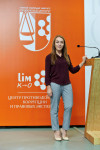 A major role in the anti-corruption education effort belongs to the media. Ms. Irina Brezhneva, deputy head of the Agency of Press and Mass Communications of the Krasnoyarsk Region, spoke about implementation of anti-corruption education in the regional, city and regional periodicals, in which special written contributions are regularly made, as well as, headline articles and other printed news articles on this topic. As Irina said, it is not uncommon for citizens caught in the corruption situation to seek for help not from law enforcement agencies but from the media.
A major role in the anti-corruption education effort belongs to the media. Ms. Irina Brezhneva, deputy head of the Agency of Press and Mass Communications of the Krasnoyarsk Region, spoke about implementation of anti-corruption education in the regional, city and regional periodicals, in which special written contributions are regularly made, as well as, headline articles and other printed news articles on this topic. As Irina said, it is not uncommon for citizens caught in the corruption situation to seek for help not from law enforcement agencies but from the media.
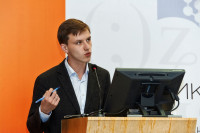 Mr. Ilya Zaitsev, head of the information broadcast section of Channel TVK-6, spoke about another mode of education through the media, including journalistic investigations of corruption offenses, issues that arise during these investigations that include: the difficulty of obtaining timely information on a corruption case from the investigating authorities (at the same time, law enforcement agencies are quite open to the media and, where possible, assist, but often are linked to the secret investigation), as well as the high costs of such investigations due to their protracted nature.
Mr. Ilya Zaitsev, head of the information broadcast section of Channel TVK-6, spoke about another mode of education through the media, including journalistic investigations of corruption offenses, issues that arise during these investigations that include: the difficulty of obtaining timely information on a corruption case from the investigating authorities (at the same time, law enforcement agencies are quite open to the media and, where possible, assist, but often are linked to the secret investigation), as well as the high costs of such investigations due to their protracted nature.
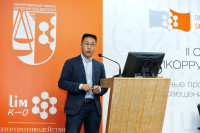 Mr. Sodnom Budatarov, Ph.D. Candidate and Director of the Center for Anti-Corruption Technologies, gave a presentation on the purposes and objectives of the anti-corruption education within the overall system of anti-corruption. Mr. Budatarov noted that the importance of the implementation of anti-corruption enlightenment and education is not so much about awareness of the negative consequences of corruption and liability for committing corruption offenses, but rather about cultivating citizens’ and employees’ respect for the law. He remarked that employees in their work activities should place emphasis upon serving society and the state, and not upon the satisfaction of their own selfish interests or other related interests.
Mr. Sodnom Budatarov, Ph.D. Candidate and Director of the Center for Anti-Corruption Technologies, gave a presentation on the purposes and objectives of the anti-corruption education within the overall system of anti-corruption. Mr. Budatarov noted that the importance of the implementation of anti-corruption enlightenment and education is not so much about awareness of the negative consequences of corruption and liability for committing corruption offenses, but rather about cultivating citizens’ and employees’ respect for the law. He remarked that employees in their work activities should place emphasis upon serving society and the state, and not upon the satisfaction of their own selfish interests or other related interests.
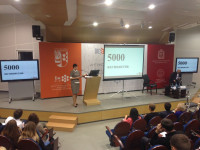 Ms. Marina Kondratyuk, Coordinator of the “Project for Clean Purchases of the Krasnoyarsk Regional Department of the All-Russian Public Movement -- People's Front for Russia” shared an experience of anti-corruption education in the field of procurements in the Krasnoyarsk regional department of the People's Front. She spoke about the project's success in curbing corruption activities and gave specifics about the role of such activities of public organizations in the anti-corruption education of citizens.
Ms. Marina Kondratyuk, Coordinator of the “Project for Clean Purchases of the Krasnoyarsk Regional Department of the All-Russian Public Movement -- People's Front for Russia” shared an experience of anti-corruption education in the field of procurements in the Krasnoyarsk regional department of the People's Front. She spoke about the project's success in curbing corruption activities and gave specifics about the role of such activities of public organizations in the anti-corruption education of citizens.
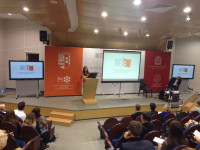 Ms. Pan Dongmei, Ph.D. candidate, and expert of the People's Republic of China, Chief of the Russian Center for the Study of Law, Professor of Heilongjiang University in Harbin of the Anti-Corruption Education in the Chinese People's Republic presented the Final Report of the Plenary Session. Ms. Pan Dongmei said that China's anti-corruption education of citizens is, practically speaking, not carried out at all. The focus is on prevention and fight against corruption in public administration. In order to ensure the prevention of corruption the disciplinary committee was created, and is now part of the activities of on-site inspections to comply with anti-corruption requirements in the provinces. In addition, the Prosecutor's Office operates the department for the fight against corruption.
Ms. Pan Dongmei, Ph.D. candidate, and expert of the People's Republic of China, Chief of the Russian Center for the Study of Law, Professor of Heilongjiang University in Harbin of the Anti-Corruption Education in the Chinese People's Republic presented the Final Report of the Plenary Session. Ms. Pan Dongmei said that China's anti-corruption education of citizens is, practically speaking, not carried out at all. The focus is on prevention and fight against corruption in public administration. In order to ensure the prevention of corruption the disciplinary committee was created, and is now part of the activities of on-site inspections to comply with anti-corruption requirements in the provinces. In addition, the Prosecutor's Office operates the department for the fight against corruption.
Another event at the forum was the presentation of anti-corruption educational methodical information for the education system of the Krasnoyarsk Region. Educational informational materials were prepared by the "Knowledge Organization of Russia” together with the Law School of the Siberian Federal University as well as the Centre for Anti-Corruption and Legal Expertise of the Siberian Federal University with a grant of support from the Agency of Youth Policy and the Implementation of Social Development Programs of the Krasnoyarsk Region. The informational material included a presentation of theoretical material, video commentary from representatives of various law enforcement agencies and from the scientific community, which in simple terms covers the complex issues of differentiation of corruption and lawful behavior, correct classification of corruption offenses and other issues, to better understand this multifaceted phenomenon of corruption.
The presentation of this information was conducted by:
Ms. Irina Damm - Director of the Centre for Counteraction to corruption and legal expertise of the "Siberian Federal University," and associate Professor of Department of Criminology and Delictology of the Siberian Federal University LS, Ph.D., associate professor, a member of the public council "Knowledge" organization of Russia;
Mr. Eugene Akunchenko – member of the Centre for counteraction to corruption and legal expertise of the "Siberian Federal University", Lecturer of Department of Criminology and
Delictology of "Siberian Federal University" Law School;
Ms. Ksenia Sukhareva – member of the Centre for counteraction to corruption and legal expertise of the "Siberian Federal University", Lecturer of Department of Criminology and Delictology of "Siberian Federal University" Law School.
The discussion platform "anti-corruption awareness and anti-corruption education as a basic form of anti-corruption", in which the importance of teaching and education, their relation to the promotion, education, training, awareness, content forms and methods of anti-corruption education and awareness, and the criteria of their effectiveness were addressed thus concluded the first day of the forum.
September 16, 2016
The second day of the forum was devoted to anti-corruption education, education and awareness of state and municipal employees.
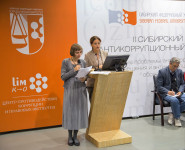 Expert presentations began with a presentation by Ms. Muriel Poisson, the head of research and development department of the International Institute for Educational Planning, UNESСO, and head of the UNESCO "Ethics and Corruption in Education" research project. Mrs Poisson spoke to the forum participants about the anti-corruption education of civil servants in foreign countries by the example of Bulgaria, Austria, France and Australia. It was noted by Ms. Poisson that the main purpose of education is the formation and consolidation of values of the civil servant on the basis of purpose of civil service – a type of service to society. As a result of undertaking training courses in foreign countries the necessary knowledge that will enable civil servants to identify risk areas and behave correctly in difficult situations can be acquired. A variety of educational formats allows for an achievement of this result: lectures, seminars, online courses, together with a variety of interactive and role-playing games.
Expert presentations began with a presentation by Ms. Muriel Poisson, the head of research and development department of the International Institute for Educational Planning, UNESСO, and head of the UNESCO "Ethics and Corruption in Education" research project. Mrs Poisson spoke to the forum participants about the anti-corruption education of civil servants in foreign countries by the example of Bulgaria, Austria, France and Australia. It was noted by Ms. Poisson that the main purpose of education is the formation and consolidation of values of the civil servant on the basis of purpose of civil service – a type of service to society. As a result of undertaking training courses in foreign countries the necessary knowledge that will enable civil servants to identify risk areas and behave correctly in difficult situations can be acquired. A variety of educational formats allows for an achievement of this result: lectures, seminars, online courses, together with a variety of interactive and role-playing games.
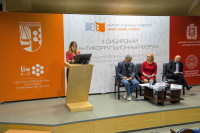 Tatiana Alekhina, Chief Adviser of the Plenipotentiary Representative of the President of the Russian Federation in the Siberian Federal District, delivered a presentation on the practice of anti-corruption training of state and municipal officials in the Siberian Federal District. The main methods of training employed are: introduction to restrictions, prohibitions and requirements imposed by the state and municipal employees, familiarization with the basic law, the holding of seminars, the publication training circular containing the provisions of the legislation, guidance and clarification, organization of work by the Methodological Centre for Anti-Corruption, the arrangement of information on official websites of authorities, and the organization of training courses. The main challenges of anti-corruption education include: inability to ensure continuity of education, lack of specialists to provide training, the careless attitude of employees to anti-corruption measures, and other factors.
Tatiana Alekhina, Chief Adviser of the Plenipotentiary Representative of the President of the Russian Federation in the Siberian Federal District, delivered a presentation on the practice of anti-corruption training of state and municipal officials in the Siberian Federal District. The main methods of training employed are: introduction to restrictions, prohibitions and requirements imposed by the state and municipal employees, familiarization with the basic law, the holding of seminars, the publication training circular containing the provisions of the legislation, guidance and clarification, organization of work by the Methodological Centre for Anti-Corruption, the arrangement of information on official websites of authorities, and the organization of training courses. The main challenges of anti-corruption education include: inability to ensure continuity of education, lack of specialists to provide training, the careless attitude of employees to anti-corruption measures, and other factors.
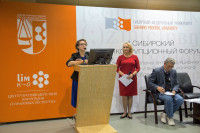 The following speakers – Ms. Marina Romanova, deputy head of the department - Head of Personnel and Civil Service Personnel Administration and Civil Service, and Ms. Marina Kalinina, Head of the Department for the Preparation of State and Municipal Employees (Human Resources Center) staff management and public service of the Governor of the Krasnoyarsk Region, spoke about educational programs of civil servants in the Krasnoyarsk Region. The following educational programs for state and municipal employees are implemented: "Anti-corruption expertise of legal acts and their projects", "Anti-corruption mechanisms in the field of state and municipal management", "Anti-corruption". There are a total number of 11 special programs and a further total number of 113 educational modules included in other educational programs. Some 388 employees are trained in special programs. A total of 4662 employees gained knowledge through educational modules. The speakers addressed the following main issues within the field of anti-corruption education: the results of checks that identify a significant number of violations do not correlate with the extent of employees training; delayed effect of education, the fact that not only employees need an explanation of legal acts, theoretical foundations of anti-corruption and the clarification of terms, and also a simple and clear criteria for the recognition of signs of circumstances where corruption arises -- "recipes" of behavior in such situations; an increase of proportion of game teaching methods is required; a shift in emphasis in training from "fight" against violators of anti-corruption legislation to training, maintenance and support of propaganda encouraging the "healthy" behavior of employees.
The following speakers – Ms. Marina Romanova, deputy head of the department - Head of Personnel and Civil Service Personnel Administration and Civil Service, and Ms. Marina Kalinina, Head of the Department for the Preparation of State and Municipal Employees (Human Resources Center) staff management and public service of the Governor of the Krasnoyarsk Region, spoke about educational programs of civil servants in the Krasnoyarsk Region. The following educational programs for state and municipal employees are implemented: "Anti-corruption expertise of legal acts and their projects", "Anti-corruption mechanisms in the field of state and municipal management", "Anti-corruption". There are a total number of 11 special programs and a further total number of 113 educational modules included in other educational programs. Some 388 employees are trained in special programs. A total of 4662 employees gained knowledge through educational modules. The speakers addressed the following main issues within the field of anti-corruption education: the results of checks that identify a significant number of violations do not correlate with the extent of employees training; delayed effect of education, the fact that not only employees need an explanation of legal acts, theoretical foundations of anti-corruption and the clarification of terms, and also a simple and clear criteria for the recognition of signs of circumstances where corruption arises -- "recipes" of behavior in such situations; an increase of proportion of game teaching methods is required; a shift in emphasis in training from "fight" against violators of anti-corruption legislation to training, maintenance and support of propaganda encouraging the "healthy" behavior of employees.
Anatoly Vishnevetzkiy, Chief Expert Legal Department "Municipal Development Institute” gave a report on the anti-corruption education and awareness measures employed at the municipal level in the Krasnoyarsk Region. Educational programs at the municipal level are conducted by experts of the "Institute of Municipal Development" at no cost. The main activities conducted with municipal employees include: practical training, seminars, placement of information boards in the office premises of municipal authorities, and posting of information on official websites. In addition, Anatoly outlined several problems arising within anti-corruption education and awareness efforts at the municipal level, including the inaccessibility of certain municipalities, lack of funding and other matters. Anatoly invited personnel of the administrative and civil service of the Governor of the Krasnoyarsk Region to cooperate with his office’s ongoing efforts.
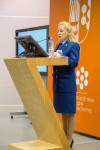 Marina Verkhoturova, prosecutor of the department for supervision over the implementation of legislation on anti-corruption of prosecutor's office of the Krasnoyarsk region, reported typical violations of anti-corruption duties, prohibitions and restrictions of state (municipal) employees. Marina reported that the regional prosecutorial authorities seek to verify compliance by public officials of anti-corruption legislation on an ongoing basis. As a priority, accuracy and completeness of the information presented on the income and expenditures, and the adoption of comprehensive measures to prevent and resolve conflicts of interest are evaluated.
Marina Verkhoturova, prosecutor of the department for supervision over the implementation of legislation on anti-corruption of prosecutor's office of the Krasnoyarsk region, reported typical violations of anti-corruption duties, prohibitions and restrictions of state (municipal) employees. Marina reported that the regional prosecutorial authorities seek to verify compliance by public officials of anti-corruption legislation on an ongoing basis. As a priority, accuracy and completeness of the information presented on the income and expenditures, and the adoption of comprehensive measures to prevent and resolve conflicts of interest are evaluated.
More than 10,000 violations in this area were identified in 2015 alone and further, more than 6,000 violations were identified in the first half of 2016. More than half of the total number of violations were revealed directly during the execution of anti-corruption laws by the state and municipal services, Further, a significant number of violations in the public sector in the sphere of state and municipal services in the implementation of state and municipal control and supervision were identified also. The number of facts relating to corruption violations revealed by prosecutors remains high in spite of the annual observance of the target verification activities. The share of violations related to the presentation of information about income and expenses in the total mass of violations of prohibitions, restrictions and responsibilities is significant, and amounts to more than 90%.
In conclusion, the prosecutor emphasized that the success of anti-corruption activities depends on the results of all of the subjects’ educational activities aimed at the creation of a society that will not tolerate corrupt behavior.
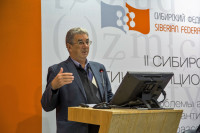 Evgeny Boyko, Advisor to the Director of the Siberian Institute of Management - a branch of the Russian Academy of National Economy and Public Administration under the President of Russian Federation (Novosibirsk) gave a presentation on the values of the public service in the systematic efforts against corruption. Evgeny noted that different values are assigned within the executive branch in different regions, and his view was that this is incorrect, and requires harmonization on the basis of the presumption that the public service is one contiguous body everywhere, and also that the principal professional value of any state employee should be that of honesty. Evgeny cited the positive experience of Denmark in support of this position, where the employment of staff requires a candidate to sign an anti-corruption agreement, the refusal of which prevents entry into the public service. He also suggested that there be an implementation of establishment of a body of personnel to inspect the beliefs, attitudes and values of the candidates in order that inadequate candidates may avoid selection and appointment to the public service by potential violators of anti-corruption standards.
Evgeny Boyko, Advisor to the Director of the Siberian Institute of Management - a branch of the Russian Academy of National Economy and Public Administration under the President of Russian Federation (Novosibirsk) gave a presentation on the values of the public service in the systematic efforts against corruption. Evgeny noted that different values are assigned within the executive branch in different regions, and his view was that this is incorrect, and requires harmonization on the basis of the presumption that the public service is one contiguous body everywhere, and also that the principal professional value of any state employee should be that of honesty. Evgeny cited the positive experience of Denmark in support of this position, where the employment of staff requires a candidate to sign an anti-corruption agreement, the refusal of which prevents entry into the public service. He also suggested that there be an implementation of establishment of a body of personnel to inspect the beliefs, attitudes and values of the candidates in order that inadequate candidates may avoid selection and appointment to the public service by potential violators of anti-corruption standards.
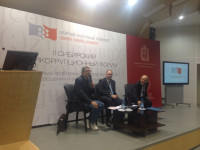 These expert presentations were followed by a discussion in which speakers discussed the theses and issues within the field of anti-corruption education of the state and municipal employees, the activities of officials of personnel services responsible for the work on the prevention of corruption and other offenses and other problematic issues.
These expert presentations were followed by a discussion in which speakers discussed the theses and issues within the field of anti-corruption education of the state and municipal employees, the activities of officials of personnel services responsible for the work on the prevention of corruption and other offenses and other problematic issues.
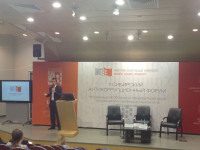 Further reports on the anti-corruption education measures implement in the countries of Anglo-American common law and Romano-Germanic civil law legal systems were made by Mr. Oleg Yanov, member of the Center for anti-corruption and legal expertise of the Siberian Federal University, and Mr. Petr Vurva, assistant of the Department of Delictology and Criminology of the Siberian Federal University Law School. Head of Legal Department "KrasAvia" - Tatiana Zaitseva also reported on trends and developments in the areas of abuse of power by government officials, for example, such as that prohibited by Article 201 of the Criminal Code.
Further reports on the anti-corruption education measures implement in the countries of Anglo-American common law and Romano-Germanic civil law legal systems were made by Mr. Oleg Yanov, member of the Center for anti-corruption and legal expertise of the Siberian Federal University, and Mr. Petr Vurva, assistant of the Department of Delictology and Criminology of the Siberian Federal University Law School. Head of Legal Department "KrasAvia" - Tatiana Zaitseva also reported on trends and developments in the areas of abuse of power by government officials, for example, such as that prohibited by Article 201 of the Criminal Code.
The forum was concluded by a summing up of the ideas that were shared and discussed during the course of this event. Two very informative and educational days proved to be very useful for all the forum participants, particularly the detailed reports on specific topics have significantly deepened the participants’ knowledge of anti-corruption education and anti-corruption measures, and expanded the idea of corruption and how to combat it. Participants left the event with the impressions that corruption itself is not the enemy, that arises externally however is something that can surface from within, and we can deal with it effectively through the hard work and commitment of every member of society, first of all individually -- “Corruption Invincible Until All Pass.”


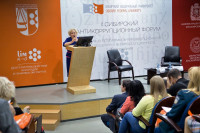






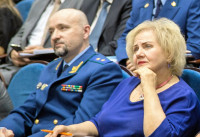
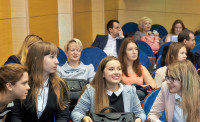
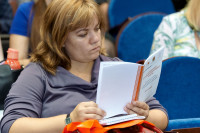
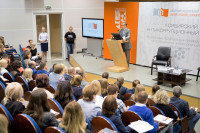
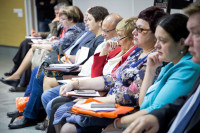
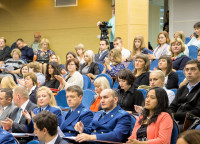
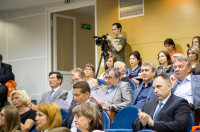
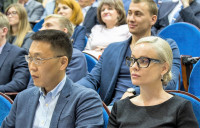
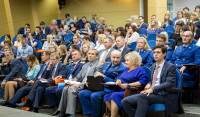
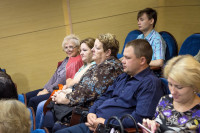
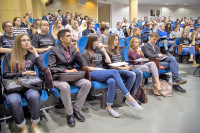
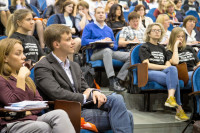

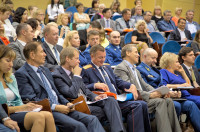
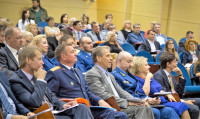
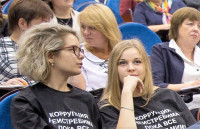
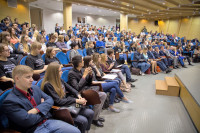
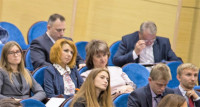
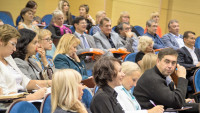
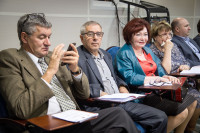
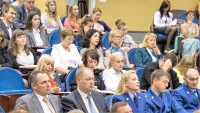













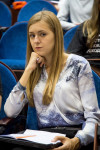


Photogalery: Day 2
